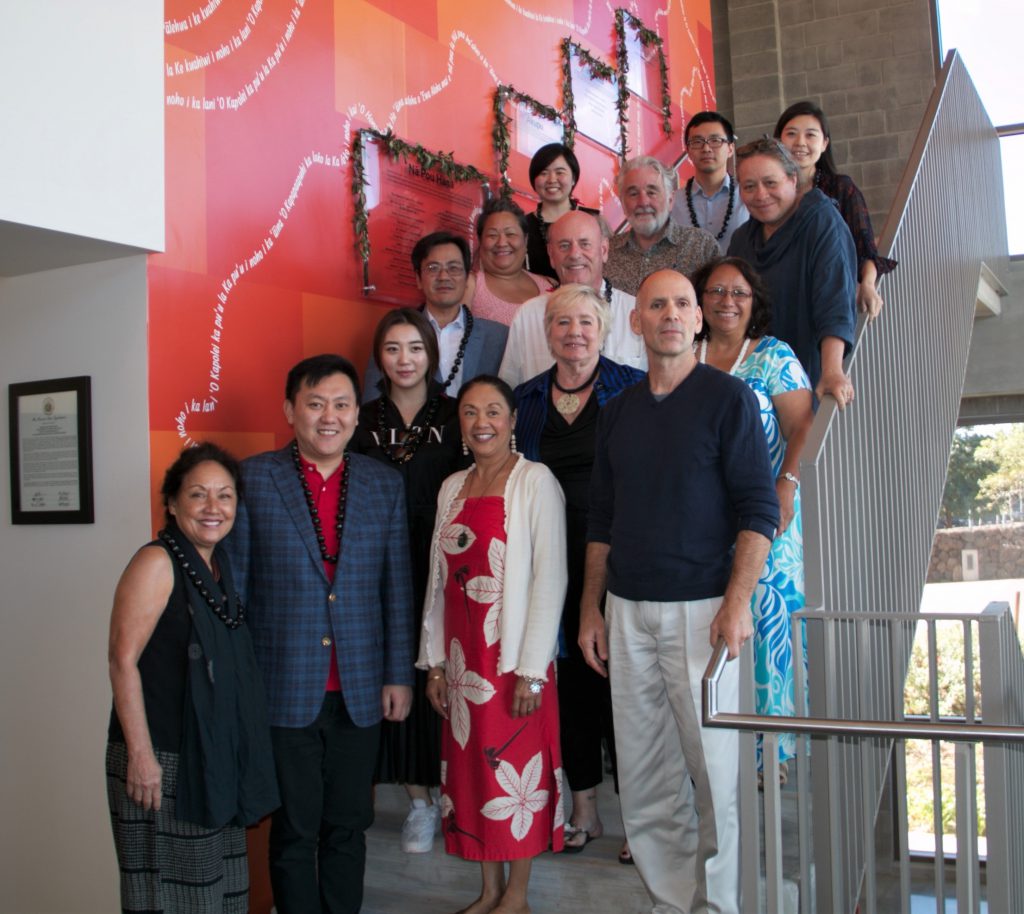
A group of young philanthropists from China learned about UH West Oahu and the Sustainable Community Food Systems program during a visit last Saturday.
A group of young philanthropists from China visited UH West Oʻahu on Jan. 5 to learn about innovative education programs and work being done by the Sustainable Community Food Systems program and its partners, MAʻO Organic Farms and Kamehameha Schools.
The visit was organized by the East-West Philanthropy Forum, an independent nonprofit organization based in Honolulu that seeks to connect philanthropic leaders for collaborative action to address pressing environmental and social issues. The group included philanthropists interested in education and innovation, and included second-generation philanthropists from China, where philanthropy is still young but growing rapidly.
“It provided us an opportunity to partner with young Chinese philanthropists who want to make the world a better place,” said Chancellor Maenette Benham, who helped open the presentations by giving an overview of UH West Oʻahu, and the responsibility it has to its community as an anchor institution in Leeward Oʻahu.
“We are looking to continue conversations that may lead to partnered work.”

Ben Niu (center) of the Lao Niu Brother & Sister Philanthropy Foundation asks a question during the presentations.
The morning began the singing of Mele Honouliuli and welcome by Dr. Manu Aluli-Meyer, Konohiki of Kūlana o Kapolei, who also noted some of the historic ties between China and Hawaiʻi. Qinghong Wang, East-West Philanthropy Forum vice president, and Deputy Chief Development Officer of the China Global Philanthropy Institute, led the group and assisted in translations to ensure a thorough understanding
The group included:
- Ben Niu, chairman of the Lao Niu Brother & Sister Philanthropy Foundation and project manager for the Lao Niu Foundation. The three primary focuses of the foundation are environmental protection, cultural education, and championing the development of China’s philanthropic sector. He has overseen many of Lao Niu’s environmental projects, including a $6 million grant to The Nature Conservancy.
- Xin Liu, executive director of the Faith Group, and chairwoman of the Chongqing Project Center at SEE Foundation, an organization of environmental entrepreneurs in China.
- Merisa Zhang, China Global Philanthropy Institution Executive Officer of International Cooperation, also assisted with the meeting.
- Mengdi Tao, assistant to the chairman of Lao Niu Brother & Sister Foundation
“We were honored that West Oʻahu Chancellor Maenette Benham and her remarkable team could spend the morning with our group of young philanthropic leaders from China,” said Dr. Qinghong Wang.
“Dr. Manu Aluli-Meyer’s warm Hawaiian greeting, Dr. Maenette Benham’s inspirational overview, and Dr. Albie Miles’ clear explanation of your community food sustainability partnerships with MAʻO Farms and Kamehameha Schools connected with our group’s interests in innovative education and building healthy communities with sustainable food systems in China. We applaud your excellent work and look forward to continuing our conversations.”
The group heard presentations from Dr. Albie Miles, head of UH West Oʻahu’s Sustainable Community Food Systems program, along with representatives from organizations that have supported the program: Kamuela Enos of MAʻO Organic Farms, and Dana Sato and Mahealani Matsuzaki of Kamehameha Schools.
Miles gave an overview of his program and explained how a holistic approach is taken to understanding food systems. He noted the impact that modern industrial agriculture has had on Native Hawaiians, touching upon health issues and community impact, and disclosed the program’s efforts to integrating Native Hawaiian’s traditional ecological knowledge and western ecological science.
UH West Oʻahu’s half-acre student garden was transformed into a productive organic garden with this knowledge and expanding to a 120-acre parcel on UH West Oʻahu’s mauka lands is being as a way to prove the concept can work on a larger scale, Miles said. A Hawaiʻi Institute for Sustainable Community Food Systems also has been proposed.
Also attending the presentations were East-West Philanthropy Forum Executive Vice President Carol Fox; Mark McGuffie, international philanthropy advisor to East-West Philanthropy; Jay Henderson, a senior advisor to the East-West Philanthropy Forum; and Aloha McGuffie, assistant to Mark McGuffie.
The East-West Philanthropy Forum was formed in January 2017 after meetings between a group of influential American, Chinese, and international philanthropic leaders at the East-West Center led to its launch. The forum serves as a bridge between partners from the East and West, uniting these leaders in collaborative efforts to address urgent issues. Forum partners include the China Global Philanthropy Institute, the Lao Niu Foundation, the Qiaonyu Foundation, the International Union for the Conservation of Nature, the Benesse Art Site Naoshima, and Panthera.
While in Hawaiʻi the group also visited other University of Hawaiʻi properties including the University of Hawaiʻi at Hilo’s ʻImiloa Astronomy Center of Hawaiʻi and the Hawaiʻi Institute of Marine Biology’s Coconut Island research facility.
